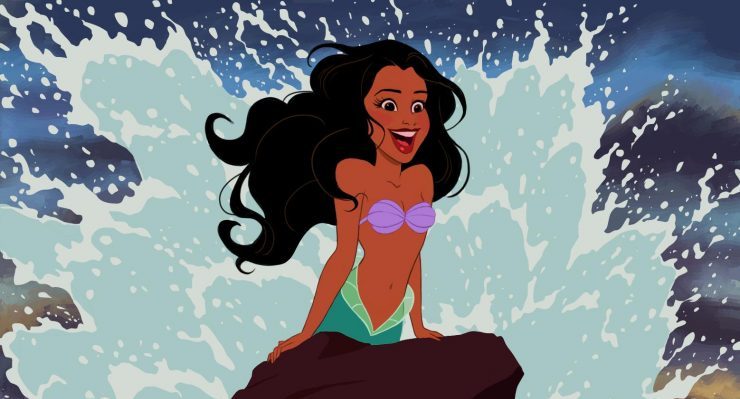
Last month my local cinema was screening 12 films — nine of which were remakes, sequels, or franchise expansions. If you pay even the scantest attention to the business of Hollywood, it’s obvious that its back catalogue is being extensively plundered.
This, of course, is nothing new. Since the dawn of the industry, with the advent of every new technology, studios go back and remake the old stuff with the latest whiz-bang gizmos and gadgets. Disney is no stranger to this — the studio, after all, has made four versions of Freaky Friday and three of A Christmas Carol — and is now slap-bang in the middle of a decades-long fever of remaking its animation inventory as live-action features.
While new technology is part of this updating process — use of sound and colour achieved this in earlier eras, CGI more recently — it’s also updating through social issues. Movies are being remade to appear suitably woke; to look as though a studio has done a tad more than simply blown the cobwebs off an old script.
My most recent book examines how sex is used to do this. Be it through making over material with female protagonists, by inserting queer characters, through adding an elongated sex scene, or freshening things up with a Me Too storyline, there’s a long history of sex being used as a tool of film and TV updates.
Race has been used in a similar way.
The notion of a black version of a film — from The Wiz (1978), to The Preacher’s Wife (1996), to Steel Magnolias (2012), to the slew of titles once euphemistically dubbed “urban” remakes — has a long history. These films exist in a strange purgatory of being lauded as furthering the representation of the marginalised while simultaneously being lamented as reductive: that surely, something a tad more inspired than a mere black version of a white story is warranted.
Stir into this discourse growing concerns about whitewashing. The recent Aladdin remake and the forthcoming Mulan both led to Disney — admittedly, not without a little audience nudging — to eschew their standard preference for hot white headliners, and instead nod to diversity and cast more in accordance with the ethnic origins of the stories.
Casting a black woman as The Little Mermaid’s Ariel is an interesting move. Unlike Mulan or Aladdin, the story — based on Hans Christian Andersen’s fairy tale — is pretty white. Danishly white. And Ariel probably could have stayed white in the live-action remake without too much furore.
But she’ll be black. And there are a lot of reasons for why — most of which are centred on the Mouse House’s pursuit of cash. I don’t say that as a criticism — every Hollywood studio exists for the same purpose — but as part of understanding how we got to this point, and how capitalism has manifested in the casting of Halle Bailey.
Whether we’ve reached “peak remake” is open for debate. But I certainly wasn’t the only one who felt that the June cinema offerings were dated. Audiences have cottoned on to the unrelenting — and perhaps exhausting — fever for commercialised nostalgia.

By casting Halle Bailey as Ariel, audiences are getting something different. Just like when Quvenzhané Wallis was cast in the 2014 Annie remake, putting Halle Bailey at the helm is a way to make an old film look a little newer. A dash more modern.
Add to this, Disney is hocking its wares in a landscape that claims to want diversity and presentations that better mirror the audience.
Add to this, Disney knows the social media calamity that casting a non-white, non-redhead as Ariel will cause in our current divisive political climate. Just as they knew that the Beauty and the Beast remake’s “exclusively gay moment” would scare and/or excite the horses, announcing a black Ariel would undoubtedly lead to a brouhaha.
Marketing films is an expensive business. Giving the Twittersphere — even if it’s just a small number of predictable racist posts that, alas, get disproportionate attention in the pop culture press — a reason to talk about a film is part of the studio’s pre-publicity efforts. It’s a way to build anticipation and get a film spoken about in a landscape that’s not only cluttered with films, but cluttered with remakes. In having the world busy debating whether we’ll swallow a black Ariel, we’re doing Disney’s marketing for them, and helping to sell a film before it’s even gone into production.
Remaking is a foregone conclusion in a risk-adverse Hollywood where filmmaking is big — and expensive — business. Looking for ways to help a remake stand out, speak to the zeitgeist and achieve cut through works to explain why Halle Bailey has been cast as everyone’s favourite mermaid in yet another Hollywood rehash.
Lauren Rosewarne is a Senior Lecturer at the University of Melbourne and currently a visiting professor at Wesleyan University. Her 10th book Sex and Sexuality in Modern Screen Remakes will be published later in 2019.







Why do they even need to remake “The Little Mermaid”? Couldn’t they just invent a new movie set in say…oh I don’t know… Madagascar ……with an all black mermaid troupe? No arguments about black-washing then.
You see all kinds of things using this marketing trick now. You can also make something really not woke to get the cultural left sharing it furiously, the cultural right buying the thing To Own The Libs etc. I wish people would see through it and block it out, like you should with any advertising.